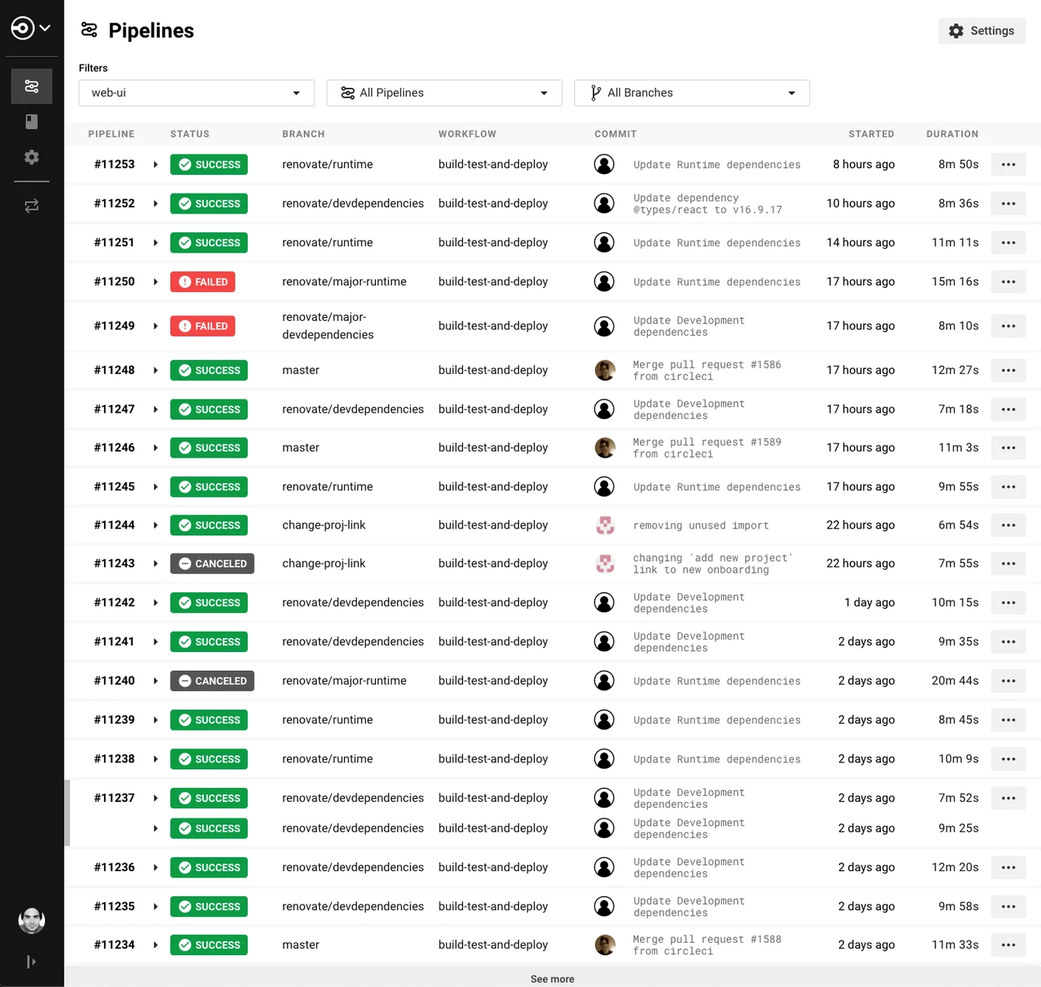10 Best Continuous Integration Tools Shortlist
Here are the top 10 continuous integration tools I’d like to highlight out of the 20 I cover in this article:
With so many different continuous integration tools available, figuring out which is right for you is tough. You know you want to automate integrating code changes from multiple developers into a single software project but need to figure out which tool is best. I've got you! In this post I'll help make your choice easy, sharing my personal experiences using dozens of different continuous integration software with various teams and projects, with my picks of the best continuous integration tools.
What Are Continuous Integration Tools?
Continuous integration tools are software that automate the merging and testing of code changes in a software development project. They enable developers to integrate their code changes frequently into a shared repository, where automated builds and tests are conducted. These tools are integral to modern software development methodologies, particularly in facilitating Agile and DevOps practices.
The benefits and uses of continuous integration tools include early detection of conflicts and bugs, improved code quality, and accelerated development cycles. By automating the integration and testing processes, these tools enhance collaboration among team members and maintain the stability of the software project. They reduce integration problems, allowing teams to develop more reliable software faster. Continuous integration tools are crucial for teams aiming for high efficiency and quality in their software development processes.
Overviews Of The 10 Best Continuous Integration Tools
Here’s a brief description of each continuous integration software to showcase each tool’s best use case, some noteworthy features, and screenshots to give a snapshot of the user interface.
Bitbucket is a Git-based code versioning platform with built-in CI CD and a best-in-class Jira integration. Built to help software teams collaborate from feature ideation to deployment, Bitbucket’s branching and commit history make it easy for multiple devs to work on the same codebase simultaneously.
Bitbucket gives devs, DevOps, and system admins an organized place to discuss code changes, view project progress at a glance, and review code versions.
Bitbucket integrates with Opsgenie, Jenkins, Slack, Amazon S3, SonarCloud, Bugnsnag, Datadog, SonarQube, ConfigCat, and others.
Bitbucket is free for up to 5 users and 50 minutes/month. Paid plans start at $3/user/month.
Ozone
Great for Automating Containerized and Decentralized App Deployments
Ozone is a CI/CD platform for simplifying and automating containerized and decentralized app deployments across hybrid clouds and a variety of blockchain networks. Ozone comes with hundreds of CD pipelines, templates, and custom workflows.
Ozone offers seamless integration with a range of Git repositories, image registries, as well as CI, CD, analytics, and automation tools including Docker, Kubernetes, Red Hat OpenShift, Slack, Microsoft Teams, Jira, Github, Google Cloud, AWS, Microsoft Azure, Jenkins, Prometheus, Snyk, and many more.
Ozone offers customized pricing upon request and comes with a 15-day free trial + free demo.
GitLab calls itself the DevOps platform. Packed with collaboration, security, software development, and testing features, GitLab helps teams to shorten SDLCs. GitLab enables teams to continuously test, verify, and deploy code. It automatically provisions infrastructure and manages changes, tickets, and release versioning, with easy rollback functionality.
GitLab offers out-the-box integrations with tools including Campfire, Flowdock, Jira, Pivotal Tracker, and Slack.
GitLab offers a free tier for individual users and Premium pricing starts at $19/user/month.
LaunchDarkly is a fast and reliable feature management tool available via SDKs for every major environment. Its feature flag code wrappers allow devs to deploy and test features and infrastructure without the risk of impacting the wrong users. LaunchDarkly’s flags offer users granular control over test deployments and flags can be changed in real-time, with zero client-side latency.
LaunchDarkly has a healthy list of out-of-the-box integrations, including (but not limited to): AppDynamics, Amazon Kinesis, Jira, Slack, Azure DevOps, Bitbucket, CircleCi, Datadog, Dynatrace, and Elastic.
LaunchDarkly costs from $10/user/month and comes with a 14-day free trial. You can also request a free demo.
Octopus Deploy is a release automation tool that enables small and large development teams alike to manage releases, automate complex app deployments, and automate both routine and emergency operations tasks—all in one place. It offers users a powerful and flexible UI across multiple environments and operating systems.
Octopus Deploy integrates with Active Directory, Azure, GoogleApps, Github, AppVeyor, Bamboo, BitBucket Pipelines, Continua CI, Jenkins, TeamCity, and more.
Octopus Deploy pricing starts from $15/month and offers a 30-day free trial.
Best Open Source Agent for Running Secure CI Pipelines on Your Own Infrastructure
Buildkite is an open source CI agent you run on your own infrastructure to check your source code, execute custom hooks and overrides, and run your build jobs. The fact that your source code never leaves your infrastructure makes Buildkite great for control, speed, and security.
Builkite is highly scalable, flexible, and extensible.
Buildkite integrates with Monorepo Diff, Docker, k8s, AWS, Git, Metahook, Perforce, and others.
Buildkite is free for unlimited users and 10,000 job minutes/month + 175,000 test executions/month. Paid plans cost from $9/user/month and come with a 30-day free trial of the plan.
CloudBees CI is a robust enterprise DevOps cloud provider built on Jenkins—the world’s most widely-used automation server. CloudBees provides highly flexible CI/CD at scale and its intuitive user interface makes it easy to learn and use.
It’s packed with governance and compliance capabilities, making it a powerful risk mitigation tool for large, compliance-first organizations.
While cloud-native, this full-featured CI tool can be hosted on-premise for organizations with stringent security protocols.
CloudBees integrates with Jenkins, Jira, Slack, Microsoft Teams, and more.
CloudBees is free for up to 15 users. Paid plans start from around $1,325/month.
Harness is a platform that enables software developers to automatically deploy, test, and roll back features with ease using either canary or blue-green deployments. This makes for faster, safer, and more efficient rollouts.
Harness users love the tool’s simplicity, as well as features like its built-in secrets management solution, reusable templates, and continuous verification and rollback functionalities.
Harness has a marketplace full of integrations and plugins, including DataGuard, Infobip, Amazon SNS, Clicksend, Mitto, Plivo, Dropbox, Basecamp, Evernote, Figma, Slack, Bamboo HR, and others.
Harness is free for up to 5 services and 100 deployments. Paid plans cost from $100/service/month. They also have a Community Edition that is free forever but entirely self-managed.
CircleCI is a purpose-built CI/CD automation platform that can be run on the cloud or on your own server/infrastructure. CircleCI enables devs to configure memory and CPU for optimized speed and performance, making parallel builds easy to support.
Users can define jobs and automate builds, tests, and deployments across multiple environments. CircleCI makes it easy to repeat processes without needing to remember all the run specs, and results are shown in an intuitive graphical user interface (GUI).
CircleCI offers out-the-box integrations with GitHub, GitLab SaaS, Bitbucket, Jira, Slack, and many more.
CircleCI is free for up to 6,000 build minutes. Paid plans cost from $15/month for 5 users.
Buddy is a development-ready staging platform that’s highly rated for continuous delivery.
It offers a high-performing build environment, unlimited delivery pipelines, deep GitHub integration, robust Docker support, and straightforward GUI and YAML configuration.
With Buddy, users can build efficient software delivery pipelines and define their own test and deployment processes. Eliminate repetition from your CICD workflows by shipping changes with a single click, git push, or with recurrent changeset-based deployments that only update what’s changed.
Buddy integrates with AWS, Azure, Bitbucket, GitHub, GitLab, Cloudflare, DataDog, DigitalOcean, DockerHub, Firebase, Logly, Shopify, Telegram, and other tools you might already use.
Buddy is free to use for up to 5 projects and 120 pipeline runs/mo. Paid plans start at $75/month (cloud) or $35/month (on-premise).
The Best Continuous Integration Tools Summary
| Tools | Price | |
|---|---|---|
| Bitbucket | From $3/user/month | Website |
| Ozone | Pricing upon request | Website |
| GitLab CI | From $19/user/month | Website |
| LaunchDarkly | From $10/user/month | Website |
| Octopus Deploy | From $50 per month | Website |
| Buildkite | From $9/user/month | Website |
| CloudBees | From $1,325/month | Website |
| Harness | From $100/service/month | Website |
| CircleCI | From $15/month for 5 users | Website |
| Buddy | From $29/user/month | Website |

Compare Software Specs Side by Side
Use our comparison chart to review and evaluate software specs side-by-side.
Compare SoftwareOther Options
Here are a few more that didn’t make the top list.
- Azure Pipelines
Best CI/CD tool for cross-platform deployment
- LaunchDarkly
Best for Managing DevOps processes in real-time
- Semaphore
Best CI/CD tool for high-performance engineering teams.
- Wercker
Best CI/CD tool for Docker-based CI/CD developer automation.
- GoCD
Best CI/CD tool for cloud-native deployments, end-to-end visualizations, and complex workflow modeling.
- JFrog
Best CI/CD tool for real-time visibility and enforcing secure access control with centralized secret management.
- TeamCity
Best CI/CD tool for DevOps-centric teams
- Bamboo by Atlassian
Best CI/CD tool for workflow automation and built-in disaster recovery capability.
- Argo CD
Best CI/CD tool for advanced application delivery for Kubernetes.
- Concourse
Best CI/CD tool for visualizing pipelines and creating reproducible, debuggable builds.
CI/CD Software Comparison Criteria
What do I look for when I select the best continuous integration platform? Here’s a summary of my evaluation criteria:
- User Interface (UI): I look for a continuous integration tool that is cleanly laid out and easy to navigate.
- Usability: I look for a continuous integration platform with a relatively low learning curve for QA teams, plus ample training material and a solid customer service team for additional resources.
- Integrations: I look for solutions that will connect and work in tandem with tools and apps that your QA team already uses, be it for programming, collaboration, or project management.
- Value for Pricing: I look for continuous integration software solutions that are fairly priced for their feature set, have scalable plan options, and offer transparent pricing from the get-go.
Continuous Integration Tools: Key Features
- Powerful build environment or staging platform. Whether you favor canary or blue-green deployment, being able to configure your environment and adjust CPU and memory enables you to optimize speed and performance.
- Support for multiple environments and operating systems: Building in a familiar environment is simpler and faster. So is easy integration with your preferred code repositories and image registries.
- Intuitive CICD pipeline manager: The ability to define jobs, automate builds and deploys, and review test results in one place can significantly shorten delivery pipelines.
- Reusable CICD pipelines and templates: Reusable workflows allow teams to work more efficiently without having to remember all the specs.
- Continuous verification: Ongoing verification with automated failure flagging reduces the testing load and massively simplifies the continuous integration process.
- Easy code rollback: Being able to reverse code commits instantly reduces risk.
- Feature flags: Flagging gives developers greater control over tests, allowing teams to roll out features on a highly selective basis that doesn’t impact users.
- Detailed commit history: This makes version control easy, even with many devs collaborating on the same code.
What do you think about this list?
What continuous integration and continuous deployment platforms do you use? Are there any that are missing from this list that you think we should have added?
What software topics would you like us to review next? Let us know in the comments below.
For more tool reviews and QA industry thought-leadership, subscribe to The QA Lead newsletter.




















